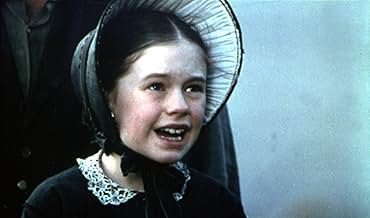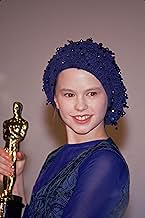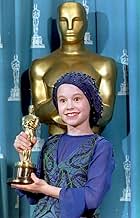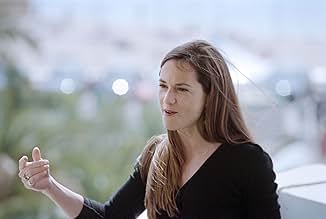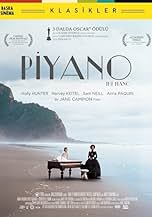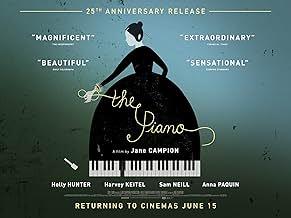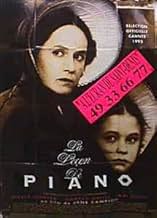Eine stumme Frau wird in den 50er-Jahren des 19. Jahrhunderts nach Neuseeland geschickt, zusammen mit einem wertvollen Klavier und ihrer Tochter, die dort einen wohlhabenden Grundbesitzer he... Alles lesenEine stumme Frau wird in den 50er-Jahren des 19. Jahrhunderts nach Neuseeland geschickt, zusammen mit einem wertvollen Klavier und ihrer Tochter, die dort einen wohlhabenden Grundbesitzer heiraten soll, bald aber heftig von einem einheimischen Plantagenarbeiter umworben wird.Eine stumme Frau wird in den 50er-Jahren des 19. Jahrhunderts nach Neuseeland geschickt, zusammen mit einem wertvollen Klavier und ihrer Tochter, die dort einen wohlhabenden Grundbesitzer heiraten soll, bald aber heftig von einem einheimischen Plantagenarbeiter umworben wird.
- 3 Oscars gewonnen
- 65 Gewinne & 57 Nominierungen insgesamt
- Nessie
- (as Genevieve Lemon)
Handlung
WUSSTEST DU SCHON:
- WissenswertesHolly Hunter learned to play the piano when she was nine years old and played most of the piano sequences herself.
- PatzerPianos of the period portrayed in the film were made almost entirely of wood, no metal framing at all, and the piano would therefore float, not sink.
- Zitate
[first lines]
Ada: The voice you hear is not my speaking voice - -but my mind's voice. I have not spoken since I was six years old. No one knows why - -not even me. My father says it is a dark talent, and the day I take it into my head to stop breathing will be my last. Today he married me to a man I have not yet met. Soon my daughter and I shall join him in his own country. My husband writes that my muteness does not bother him - and hark this! He says, "God loves dumb creatures, so why not I?" 'Twere good he had God's patience, for silence affects everyone in the end. The strange thing is, I don't think myself silent. That is because of my piano. I shall miss it on the journey.
- SoundtracksThe Heart Asks Pleasure First/The Promise
Michael Nyman
Australian director Jane Campion's erotically-charged Gothic love story was a huge success back in 1993, winning the Best Actress Academy Award for Holly Hunter and Best Supporting Actress for Paquin, who became the second youngest recipient ever. Hunter's shadowy Ada is the backbone of The Piano, and while it may appear that it is her piano that fuels her passion, it is very much her own mind and experiences that dictate her actions. She is quite a fascinating character - not merely the put-upon mute who longs for love and her piano - she is actually rather subtly manipulative and sexually powerful, weighing up the two love interests in her life, and playing a dangerous power game with her increasingly jealous husband.
The contrast between the two men in Ada's life couldn't be any obvious - Stewart playing dutiful, business-minded and quite inept in courtship, while Baines is hulking, living out in the forest, his face spotted with native Maori tattoos - but it is quite clear as to where Campion's preferences life. Ada's scenes with Baines, in which he listens to her play, become the centrepiece for some highly erotic moments, playing out more like animal foreplay than anything human. Ada seems not to bat an eyelid when Baines lies on the floor by her feet, fingering a hole in her stocking, or simply walks around the room completely naked. While these unconventional actions are there to channel Ada's sexual repression/release and Baines' animalistic nature, these scenes often appear forced, filled with lazy or nonsensical metaphors passed of as spiritual film-making.
As with many Australian period films, The Piano looks stunning. The exotic location is not filmed through a sun-tinted lens, and nor does it capture any of the colourful wildlife (something you would expect if Terence Malick had directed it), but is grey, wet and muddy. Like Peter Weir's Picnic at Hanging Rock (1975) and Gallipoli (1981), it has that lived-in feel, with Hunter's beautiful, ghostly face evoking a 19th- century photograph, where everyone looks grim and pale, and Campion's occasionally snapshot approach captures the mundane, everyday actions of the period. The performances are a revelation, with Hunter and Paquin deserving their accolades, and Keitel proving a formidable presence (I'll not mention the accent). The Piano is personal film-making, but too often the film seems to be striving for that mystical atmosphere rather than actually capturing it, occasionally getting lost amongst Campion's obvious adoration for her protagonist.
www.the-wrath-of-blog.blogspot.com
- tomgillespie2002
- 9. Jan. 2013
- Permalink
Top-Auswahl
Details
- Erscheinungsdatum
- Herkunftsländer
- Offizielle Standorte
- Sprachen
- Auch bekannt als
- The Piano
- Drehorte
- Produktionsfirmen
- Weitere beteiligte Unternehmen bei IMDbPro anzeigen
Box Office
- Budget
- 7.000.000 $ (geschätzt)
- Bruttoertrag in den USA und Kanada
- 40.157.856 $
- Eröffnungswochenende in den USA und in Kanada
- 151.419 $
- 14. Nov. 1993
- Weltweiter Bruttoertrag
- 40.185.556 $
- Laufzeit2 Stunden 1 Minute
- Farbe
- Seitenverhältnis
- 1.85 : 1
Zu dieser Seite beitragen








